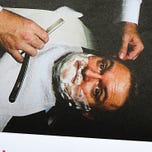I originally planned to outline the history of pamphleteering for you here and explain, with the help of Paul Wells, how I think it resembles Substacking. The fact, for example, that pamphlets were among the first things to come off the printing press in the 1450s; that Martin Luther was a big-time pamphleteer; that flippant, lively pamphlet writing effectively satirized lots of flagrantly decadent behavior at the French Court during the 18th century, and that Blaise Pascal raised the art of the pamphlet to the level of literature; and that pamphlets were wielded as lethal weapons in 17th Century England, and that political parties employed the likes of Addison, Steele and Swift to thrust their messages out; that Thomas Paine’s pamphlet Common Sense caused the American “Revvie;” and that the Federalist Papers were cribbed from pamphlets written by Alexander Hamilton, John Jay and James Madison.
But we’ll have to wait.
According to the Encyclopedia Britannica the Federalist Papers mark the end of the era of the political pamphlet. From here on in, ‘political dialogue was largely carried on in newspapers, periodicals and books.’
Maybe pamphleteering has nothing to do with Substack.
Paul Wells is a leading Canadian political journalist and author. We met in his office in Ottawa to talk about his storied career, and his craft: writing about politics for newspapers, magazines, books, and now Substack.
Topics covered in our conversation include observing and interviewing politicians; reading and remembering history; putting events into context; pre-revolutionary Paris; pedagogy; helping people; recited formulas, thrown slogans, and knowing you’re being lied to; the difficulty politicians experience actually making a difference in the world; discussing issues in their full complexities; “the wall of words,” “the significant trifle;” including yourself, and analysis, in your narratives; paying for Substack subscriptions because you want to make comments; filling the ‘weekend supplement’ niche; understanding each other as neighbours; and the secret to a successful marriage.
The pamphleteering palaver will wait. Perhaps it’ll surface in a conversation with Margaret Atwood, scheduled for later this Fall, when we’ll talk about her new book Paper Boat; she is, after all, really good on history.
Finally, about political writing, here’s Clive James on George Orwell:
"Orwell’s standards of plain speaking always were and still are a mile too high for politicians. What finally counts with politicians is what they do, not how they say it. But for journalists how they say it counts for everything. Orwell’s style shows us why a style is worth working at: not just because it gets us a byline and makes a splash but because it compresses and refines thought and feeling without ceasing to sound like speech — which is to say, without ceasing to sound human. At a time when ideological politics still exercised such an appeal that hundreds of purportedly civilized voices had ceased to sound human, Orwell’s style stood out. The remarkable thing is that it still does"

















Share this post